Last updated: February 25, 2023
Any links on this page that lead to products on Amazon are affiliate links and I earn a commission if you make a purchase. Thanks in advance – I really appreciate it!
Like many things in life, people have differing opinions, and that’s especially true for horse fencing. Some horse owners tout weaved wire safety, while others would never consider using anything other than a wood board fence to enclose their pastures. So, I decided to do some research to find out which is best for horses.
The best choice of horse fencing material, specifically between wood board or woven wire, depends on your needs, budget, and personal preference. Both are suitable horse fencing materials with advantages and disadvantages. The primary consideration is the safety of your horses.
How do you know if a wood board or woven wire fence is better to use? Before you can make any final decisions, there are essential factors to consider.
Factors to Consider When Choosing Horse Fencing
As a horse owner, I learned the hard way how crucial it is to choose the right type of fencing for my horses. When I first started out, I opted for cheap and flimsy fencing that was not strong enough to withstand the wear and tear that comes with horses.
It didn’t take long for my horses to escape, causing them to wander onto a busy road and putting their safety at risk. After that experience, I realized the importance of good fencing to ensure my horses were always safe and secure.
Here are the factors to consider when choosing horse fencing:
- Safety of horses: The primary consideration when choosing a horse fence is the safety of the horses. The fence should be strong enough to keep horses contained within the designated area and prevent them from escaping. Additionally, the fence should not have any sharp edges, protruding nails, or other hazards that could potentially injure the horses.
- The durability of the fence: Horse fencing should be able to withstand the wear and tear that comes with horses rubbing against it, pushing on it and doing other activities. A durable fence will last longer, be more cost-effective, and require less maintenance.
- Maintenance requirements: Horse fencing should be easy to maintain and not require frequent repairs. Wood fencing, for example, may require regular staining and sealing, while other types of fencing may require occasional cleaning or adjustment.
- Visibility for horses: Horses have a hard time distinguishing fencing from the surrounding environment. The fence should be clearly visible to the horses to prevent them from running into it or injuring themselves by attempting to jump it.
- Cost: The cost of horse fencing is an important consideration. The type of fencing chosen should be within the budget, and the overall cost of ownership should be taken into account. The cheapest option may not necessarily be the most cost-effective in the long run if it requires frequent maintenance or replacement.
By considering these factors, you can choose a fence that meets the needs of both you and your horses.
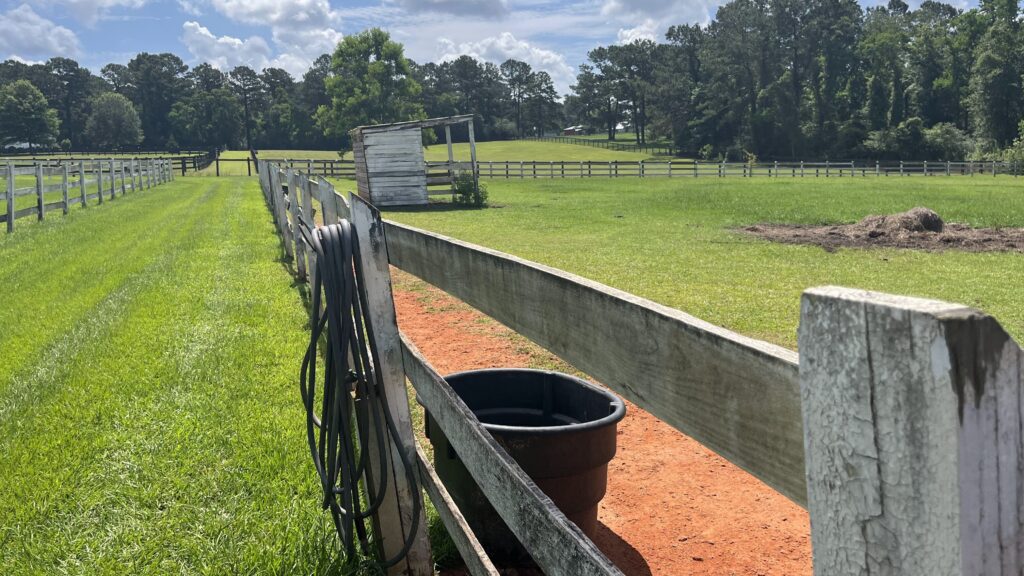
Types of Fencing
Here are some of the most common types of horse fencing:
- Wood Fencing: Wood fencing is a popular and traditional option for horse owners. It can provide a classic look to your property, and horses tend to respect it well. However, wood fencing requires regular maintenance, such as painting, staining, and sealing, and can be costly to repair.
- Vinyl Fencing: Vinyl fencing is a low-maintenance alternative to wood fencing. It is durable and does not require any painting, staining, or sealing. It is also available in various styles and colors to match your property. However, vinyl fencing can be costly to install and is not as strong as other types of fencing.
- PVC Fencing: PVC (polyvinyl chloride) fencing is a durable and low-maintenance option. It is weather-resistant and can withstand harsh weather conditions. PVC fencing is available in various styles and colors, making it a popular choice among horse owners. However, PVC fencing can be costly to install and is not as strong as some other types of fencing.
- Mesh Fencing: Mesh fencing is a strong and durable option for horse owners. It is made of woven wire mesh, which is difficult for horses to break through. Mesh fencing is also visible to horses, making it less likely for them to run into it. However, mesh fencing can be expensive to install and may require regular maintenance.
- Electric Fencing: Electric fencing is a popular option for horse owners who need a temporary or semi-permanent solution. It is low-cost, easy to install, and can be moved around as needed. Electric fencing also allows horses to see beyond the fence, making it less likely for them to run into it. However, electric fencing requires regular maintenance and can be dangerous if not installed properly. Additionally, electric fencing may not be suitable for some horses that are prone to running through fences.
By understanding the pros and cons of each type of fencing, you can choose the one that best suits your needs and budget.
Check out this helpful YouTube video; it compares wood and wire horse fences.
Wood Board Fencing
Wood board fencing consists of vertical wooden posts that support wooden planks or wooden poles running horizontally. The wood board fence is a common choice among property owners with horses.
Different types of wood may be used in the composition of the fence, from pine to hardwood. Depending on the wood’s aesthetic value, some property owners may paint the wood fencing or use a sealer to keep it protected from the elements.
This horse fencing does not come without its drawbacks. Wood board fencing can be a more costly type of fencing material. It requires regular maintenance to prevent serious damage. Like with any wooden product exposed to the elements, the boards may become loose or crack over time, requiring replacement.
A cracked or loose board can pose injury to the horse from exposed nails, not to mention the dangers of a horse escaping through this damaged fencing and running into traffic or predators.
One thing to consider when using wood board fencing with your horses is that splinters can occur, causing injuries. Local veterinarians often say to use caution with these fences because if a horse runs through the boards, the remnants can end up embedded in the horse’s skin.
Woven Wire Fencing
Woven wire fencing is made using vertical and horizontal wires. These wires may be woven in different configurations that range from larger spaces to smaller ones. Some woven wire fences are tied at the intersections with wire knots, while some are simply woven.
Both types of woven wire horse fencing flex and give under pressure to prevent injury or fence failure. The woven wire fencing cost falls in between an electric fence and wood board fencing, but it is very cost-effective since it lasts for an extended period.
Additionally, woven wiring fencing is often a go-to choice for DIY-savvy horse owners because it’s often easier to install than other fencing types, such as wood boards. Like all fence types, regular inspections and routine maintenance are required to ensure the fence is safe and secure.
In order to have the best success with a woven wire horse fence, you need to ensure the fencing materials are installed properly. If posts are not buried deep enough or in line with each other, the fencing could become weak, especially against a bolting horse.
A combination of quality woven wire and durable posts will enable your fence to last for years to come. Like all fence types, regular inspections and routine maintenance are required to ensure the fence is safe and secure.
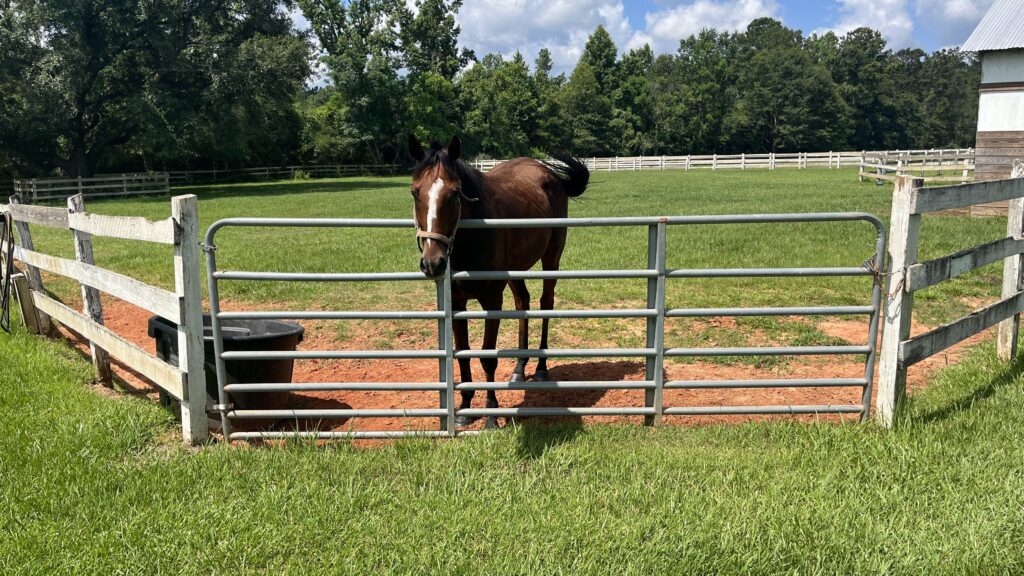
How to Choose the Best Horse Fencing For Your Needs
How do you know what type of fencing to purchase? If you ask any expert, they are likely to tell you that it “depends.” The answer doesn’t get much more straightforward than this because personal preference plays a big part.
Some horse owners swear by wood board fencing only, but others may like woven wire fencing. Fencing has one primary job – enclosing a dedicated space to keep horses safe. Bob Coleman, Ph.D., a state extension specialist at the University of Kentucky, states that “a fence should be able to keep horses on your side of the property line.
Also, you might want to restrict access to your horses by keeping out neighborhood dogs, predators, or small children.” Simple enough, right?
Depending on the type of fencing you choose, this may be easier said than done. Here are some factors you need to consider for the “right” fence:
- What is your fencing budget? Fencing can be expensive, depending on the materials you choose. Invest in the best fence your budget allows providing the safest, most durable, and maintenance-free option.
- What is in the area surrounding your horse barn? Predators in your area could be a cause for concern for both the health and safety of your horses. You’ll need a fence designed to keep unwanted animals from penetrating the enclosure. A strong, tight mesh construction can prevent dangerous predators from harming your horses.
- Does your horse like to graze? The quality of grazing available in your pasture may determine which type of fencing is required to keep your horse from escaping. If your pasture lacks grass or hay and your horse likes to graze, then he may be more inclined to reach through the fence to get to the grass on the other side. In this case, a stronger fence that flexes, like woven wire, might be the best solution.
- Are you fencing the perimeter of your farm or interior space? Fences that run the perimeter of the farm can be a bit flimsier since they are not necessarily designed to keep horses in. However, for interior fencing, it is recommended you use strong materials that can withstand grazing pressures and running horses.
- How much room do your horses have to run? Horses require a lot of space for exercise and activity. When they don’t have ample room, they will begin to test their boundaries. If you use fencing that is not strong enough to stop them from seeking more area, you could be rounding up horses and fixing fences more than you would like. As I mentioned earlier, woven wire fencing flexes under pressure and could be an excellent option to withstand a running horse’s impact.
- Are time and money available for maintenance? Do you have the appropriate amount of time and money it takes to work with a higher-maintenance fence? Consider investing in the easiest, longest-lasting solution you can. In this case, woven wire is the better option over wood-board fencing.
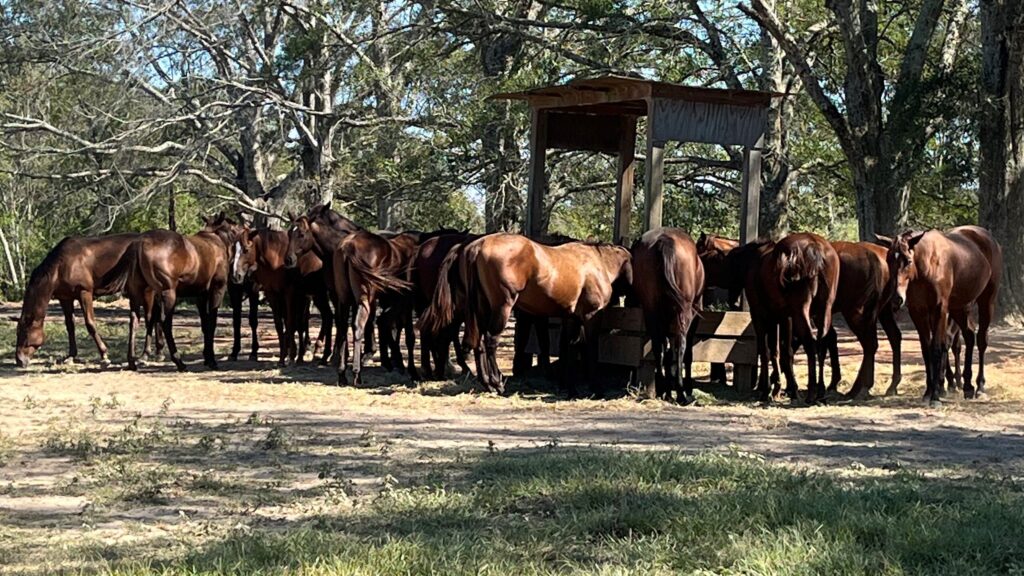
Choosing the Right Fence
If you are “on the fence” about which materials to choose and have the resources to do so, some horse owners prefer to double up. The combination of wood boards and woven wire is popular because it offers stability and security while providing an attractive addition to your property.
By having a wooden board across the top of the wire fencing, horses are much less likely to smash the fencing down or cut themselves on the ends of the wire. Additionally, this type of setup is helpful for horses that like to test boundaries.
In smaller paddocks or corrals, horses sometimes need a psychological and physical barrier to know they should stay where they are. A wood board and woven wire combination could provide the visibility and strength a horse fence needs.
If you decide to install wire fencing with a wood board, ensure the board is installed inside the fence posts. This way, horses are prevented from hurting their shoulders on a post.
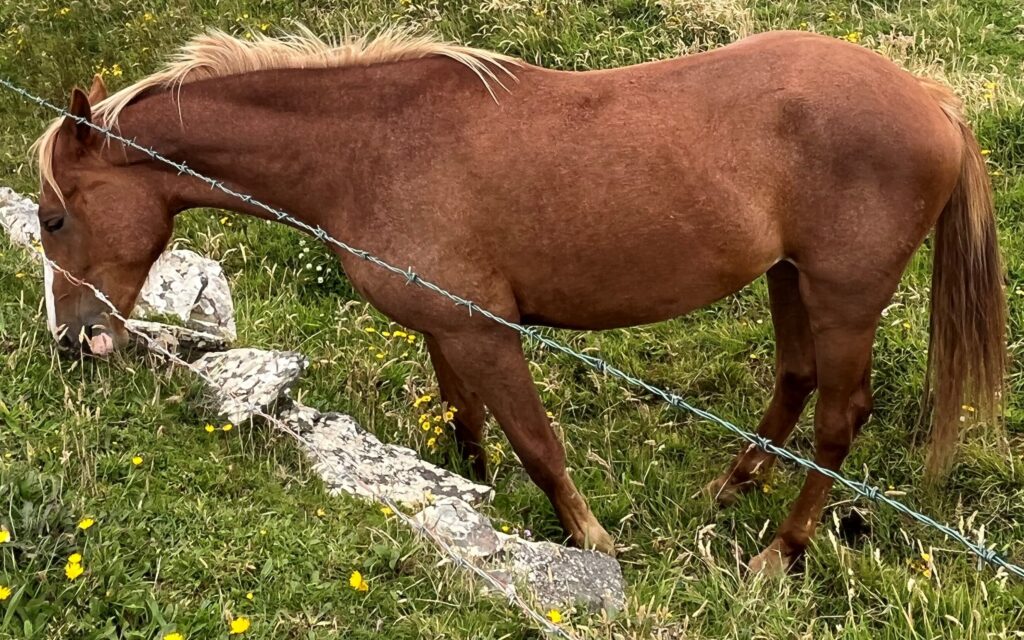
Why Your Horse Fencing Matters
You take great pride in your horses, which means you take pride in the care you provide them. Part of that care is making sure they are protected and safe at all times. When you have the proper fencing on your farm, your horses are safe and secure.
If you are ever at a loss and unsure what decision to make, ask a fencing professional, veterinarian, or equine specialist to help you find the right fencing.
Whether you ultimately decide to install a woven wire or wooden board fence depends on the counsel you seek, the personality of your horses, the size and area of your pasture, and your budget and personal tastes.
An important matter like which type of horse fencing you choose deserves careful consideration, so take your time determining the best fencing.
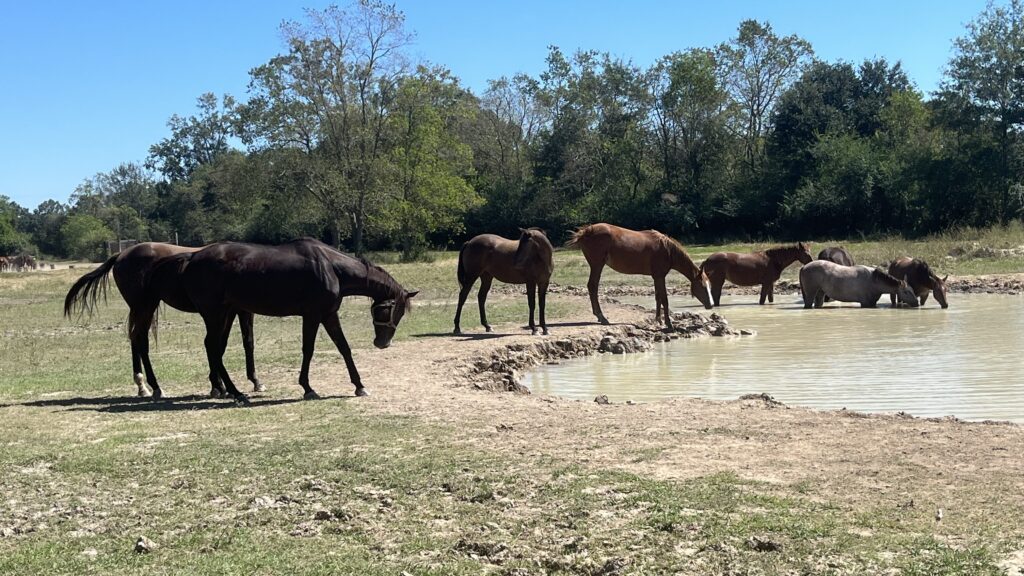
FAQ
What is the best floor material to use in a horse barn?
The best floor material depends on the area of the barn. For stalls, I prefer clay, but in aisleways, feed, and tack rooms, firmer surfaces like asphalt, gravel, or concrete work better. To read more about barn floor materials, check out this article: What’s the Best Horse Barn Flooring: Stalls, Aisles, Tack Room.
What is a horse paddock?
A horse paddock is a small fenced area; they are frequently used to separate horses to recover from an injury, to limit grazing, or prevent bullying. In horse racing, the area used to saddle horses for a race is also called a paddock.
To learn more about horse paddocks, read this article: What are Horse Paddocks? Their Uses, Sizes, and Cost.
Check out the YouTube video below to find out which type of fencing a vet recommends for horses.
Author Bio:
Dain Rakestraw is the Director of Marketing and Client Services at Red Brand, a line of premium agricultural fencing products known as the most recognized brand of agricultural fencing in the United States.

About the Author: Miles Henry
Lifelong Horseman | Racehorse Owner | Published Author
Miles Henry brings over 25 years of hands-on experience training and owning Thoroughbred racehorses. Raised with Quarter Horses and Appaloosas, he’s spent a lifetime learning from horses—on the track, in the barn, and in the field. Today, he runs a small but successful racing stable in Louisiana and shares real-world insights on HorseRacingSense.com, helping horse owners, fans, and bettors navigate the sport with confidence.
📚 Books: View Miles’s books on Amazon »
🎧 Podcast Guest: Animal Tales Ep. 32 |
YouTube Interview
📩 Newsletter: Sign up for racing tips and horse care advice »
🔗 Follow Miles:
Twitter |
Facebook |
YouTube



